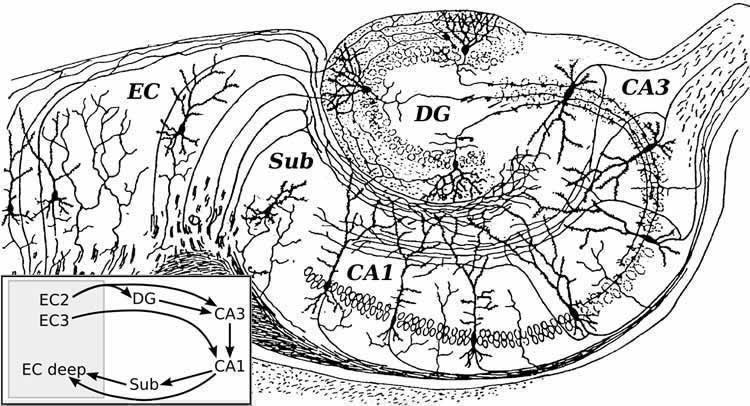Summary: Hippocampal replay selectively enhances memory of highly rewarded locations in a familiar context.
Source: VIB
A team of scientists at NeuroElectronics Research Flanders (NERF- empowered by imec, KU Leuven and VIB) found that highly demanding and rewarding experiences result in stronger memories. By studying navigation in rats, the researchers traced back the mechanism behind this selective memory enhancement to so-called replay processes in the hippocampus, the memory-processing center of the brain. These important findings provide new insights into one of the most enigmatic brain features: memory consolidation.
When we experience something important, we usually remember it better over time. This enhanced memory can be the result of stronger memory encoding during the experience, or because of memory consolidation that takes place after the experience. For example, experiences that turn out to be very rewarding have been found to lead to stronger and longer-lasting memories.
“One of the ways in which our brains consolidate memories is by mentally reliving the experience,” explains Prof. Fabian Kloosterman, whose research is aimed at unravelling memory processing in the brain.
“In biological terms, this boils down to the reactivation or replay of the neuronal activity patterns associated with a certain experience. This replay occurs in hippocampal-cortical brain networks during rest or sleep.”
The question Kloosterman and his team at NERF set out to answer was whether the positive effect of rewards on hippocampal replay extend beyond the time of the experience itself and thus could further support enhanced memory consolidation.
Rewards and challenges
To find answers, the researchers’ trained rats to learn two-goal locations in a familiar setting. One of the goals was a large reward–nine food pellets–while the other goal location only had a single food pellet on offer as a small reward. “Perhaps unsurprisingly, we found that rats remembered better the location where they found the large reward,” says Frédéric Michon, PhD student in the Kloosterman lab, who conducted the experiments. “But we also observed that this reward-related effect on memory was strongest when the food pellets were located in places that required more complex memory formation.”

Replay for better memory
To assess the contribution of replay brain activity after the actual experience, the researchers disrupted this particular signaling network, but only after the rats got a chance to discover the reward locations. Michon: “Mirroring our earlier findings, we observed that memory was impaired only for the highly rewarded locations, and in particular, when the rewards were at challenging locations.”
In sum, the researchers could demonstrate that hippocampal replay, occurring after initial learning, contributes to the consolidation of highly rewarded experiences and that this effect depends on the difficulty of a task. “A relatively simple experimental setting with rats and food pellets can teach us a lot about memory,” says Kloosterman. “Our results demonstrate that replay contributes to the finely tuned selective consolidation of memories. Such insights could open future opportunities for treatments that help to strengthen memories, and could also help us understand memory decline in diseases such as dementia.”
Source:
VIB
Media Contacts:
Sooike Stoops – VIB
Image Source:
The image is in the public domain.
Original Research: Open access
“Post-learning Hippocampal Replay Selectively Reinforces Spatial Memory for Highly Rewarded Locations”. Frédéric Michon, Jyh-Jang Sun, Chae Young Kim, Davide Ciliberti, Fabian Kloosterman. Current Biology. doi:10.1016/j.cub.2019.03.048
Abstract
Post-learning Hippocampal Replay Selectively Reinforces Spatial Memory for Highly Rewarded Locations
Highlights
• Rats show stronger memory for highly rewarded locations
• Disruption of hippocampal SWRs only affects memory for highly rewarded locations
• Hippocampal replay events are biased to trajectories associated with high reward
Summary
Offline replay of hippocampal neural patterns supports the acquisition of new tasks in novel contexts, but its contribution to consolidation of salient experiences in a familiar context is unknown. Here, we show that in a highly familiar spatial memory task, large rewards selectively enhanced performance for demanding task configurations. The reward-related enhancement was sensitive to ripple-specific disruption, and the proportion of replay events positively correlated with reward size and task demands. Hippocampal replay thus selectively enhances memory of highly rewarded locations in a familiar context.






